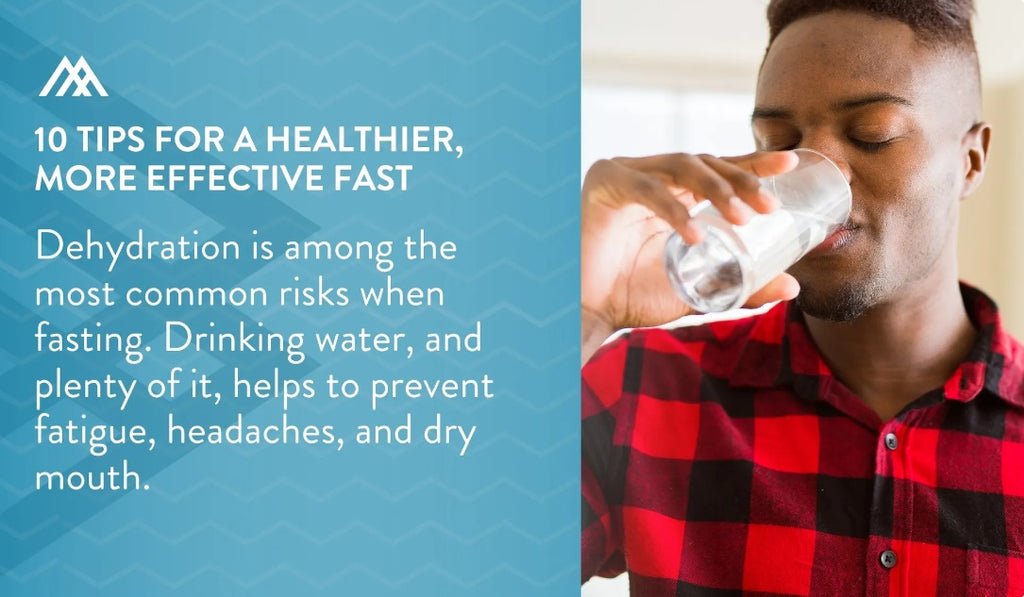Your Cart is Empty

January 19, 2021 5 min read
It's no accident that this is number one on our list. With any diet or fast, the most important thing you can do is to know your risks and listen to your body. It's common to feel tired, hungry, and irritated (AKA hangry) when fasting - that is a normal part of the "trade-off". With that said, you should not feel unwell. If you feel faint, extremely weak, uncomfortable, or sick, it's time to call it quits. Keep a healthy snack nearby to boost your blood sugar levels back up. Seek medical attention if your symptoms are severe (can't stand/carry out normal tasks, fainting, etc.) or if you don't seem to be recovering after easing your way back into an eating schedule.
The fact of the matter is that fasting isn't for everyone. Specific health conditions like diabetes need to be particularly careful or avoid fasting altogether to avoid low blood sugar which is common during a fast. Women who are pregnant and breastfeeding or women who are trying to conceive should also avoid fasting. Fasting can be dangerous for those with heart disease or other heart conditions, low blood pressure, or amenorrhea and it should be avoided. Lastly, anyone who has experienced an eating disorder or who is underweight should avoid fasting and instead turn to a registered dietitian or nutritionist to help manage their specific nutritional and wellness concerns.

Dehydration is among the most common risks when fasting. Drinking water, and plenty of it, helps to prevent fatigue, headaches, and dry mouth. It also helps us to stay alert and feeling full. During a fasting day, you should aim to drink 2-3 liters of water and listen to your body when it tells you that you need more. You can drink water, tea, coffee, or water with electrolytes safely without breaking your fast. If you’re a coffee drinker, take it slow to see how it affects your body.

One of the best parts about fasting is that you don't have to stick to one specific schedule. For instance, during Ramadan total fasting is practiced from sunrise to sundown. Some modern fasting techniques mimic this schedule, but ultimately you can find what works for your schedule and your body. Especially for beginners, you'll want to fast in 24-hour windows or less. If you want to venture into longer fasts, you should do so under strict medical supervision or you will run the risk of dangerous side effects such as fainting and dehydration. Common short-term fasting schedules include:
Your exercise days are not the days to continue your HIIT program, but getting some light exercise can help to take your mind off of food. Keeping busy with light exercise like walks, meditation, yoga, and stretching can help you to get over your midday hump. Cardio is good in small doses, but don't overdo it and wear yourself out.
Take our quiz and find which supplements your body is craving.

Just like the point above, keeping your mind active and busy helps to reduce your risk of "breaking" your fast. It's a perfect time to pick up a craft, read a book, or binge your favorite docu-series.
You might get some wild cravings while you're fasting, but it's important to stick to a nutritious, healthy meal whenever your fasting period is up. If your fasting goal is to reduce body weight, overeating after a fast eliminates the progress gained from your fast. It can also make you feel bloated and sluggish. Rather than sugary or greasy foods after you break your fast, look for whole grains, healthy fats such as nut butters and olive oil, lean protein, fruits and veggies of course, and beans rather than carb-heavy foods.

The main reason people fast (aside from religious purposes) is to lose weight. When our body doesn't have enough carbohydrates, it will begin burning fat for energy. This is what the keto or ketogenic diet aims to capitalize on. What many people fail to realize, however, is that calorie deficits can also lead to muscle loss. That's why getting a diet with plenty of protein is so important. Protein can also help us to feel fuller longer, so we have fewer cravings as we fast. Look for lean protein sources, like chicken breast, grass-fed beef, ground turkey, or clean protein supplements to get all the protein you need without all the calories.
As we mentioned above, protein is crucial to your diet whether you are fasting or not. If you aren't getting enough protein through your everyday diet, or if you aren't happy with your lean diet choices, supplements can help. Collagen is the most plentiful protein in the human body, and marine collagen supplements are extremely bioavailable and low in calories, making them the perfect fasting-supplement. With only ~35 calories per scoop, you can easily get your daily recommended amount of protein without truly breaking your fast. Add it to your cup of coffee or stir it into your water to boost your nutrition without busting your fast. Bone broth soup, which is naturally high in collagen, is also another way to gently and healthfully break a fast.
Lastly, remember to start out slow. Jumping straight into a week-long fast will surely set you up for failure and it could put your health at risk too. If you've eaten steady meals your entire life, going even just 16 hours without food can cause symptoms that you're not used to. Before you begin a fast of any length, be sure to reach out to your doctor or dietician to see if it is the right fit for your personal health history.
Want to learn more about how you can optimize your fast with protein supplements? The Amandean team is here to help. You can read our blogs for in-depth knowledge on all your looming "to fast or not to fast" questions. Check out:
Or search for your specific health goal or concern to see what the Amandean experts have to say!
With any diet or fast, the most important thing you can do is to know your risks and listen to your body.
Specific health conditions like diabetes need to be particularly careful or avoid fasting altogether to avoid low blood sugar which is common during a fast.
Drinking water, and plenty of it, helps to prevent fatigue, headaches, and dry mouth.
If you want to venture into longer fasts, you should do so under strict medical supervision or you will run the risk of dangerous side effects such as fainting and dehydration.
Look for lean protein sources, like chicken breast, grass-fed beef, ground turkey, or clean protein supplements to get all the protein you need without all the calories.
Collagen is the most plentiful protein in the human body, and marine collagen supplements are extremely bioavailable and low in calories, making them the perfect fasting-supplement.

April 24, 2024 8 min read

April 17, 2024 4 min read

April 01, 2024 7 min read